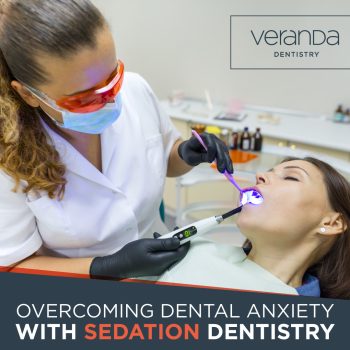Overcoming Dental Anxiety with Sedation Dentistry
 For many people, visiting the dentist can be a source of overwhelming anxiety or fear, a knot in the stomach, and a racing heart at the mere thought. Fortunately, sedation dentistry offers a solution to help you feel calm, comfortable, and in control during dental procedures, a gentle hand guiding you through what once seemed impossible. If dental anxiety has been keeping you from achieving optimal oral health, holding you back from a brighter smile, and a healthier you, this guide explains how sedation dentistry can help and what to expect.
For many people, visiting the dentist can be a source of overwhelming anxiety or fear, a knot in the stomach, and a racing heart at the mere thought. Fortunately, sedation dentistry offers a solution to help you feel calm, comfortable, and in control during dental procedures, a gentle hand guiding you through what once seemed impossible. If dental anxiety has been keeping you from achieving optimal oral health, holding you back from a brighter smile, and a healthier you, this guide explains how sedation dentistry can help and what to expect.
What Is Sedation Dentistry?
Sedation dentistry uses medication to help patients relax during dental procedures. It’s a safe and effective way to ease anxiety and manage discomfort in the dental chair, transforming a dreaded appointment into a moment of calm.
Types of Sedation Dentistry Explained
Not all types of sedation are available at every dental office. Ask your dentist for details on which types of sedation they offer. At Veranda Dentistry, Dr. Johnson and his team understand the unique needs of patients in Pleasant Hill and Johnston, IA, and offer gentle, effective sedation options.
- Nitrous Oxide (Laughing Gas): A mild sedative inhaled through a mask, offering relaxation without the need for recovery time, a light, airy feeling that melts away stress.
- Oral Sedation: Medication taken before the appointment to promote a deeper state of relaxation while remaining conscious.
With nitrous oxide, you should be able to drive yourself home from your appointment, as the effects wear off almost immediately. With oral sedation, you will likely need someone to drive you (ask your dentist for specific information). With IV or general anesthesia, you will definitely need a friend or family member to drive you home after your procedure.
How Sedation Dentistry Helps Overcome Dental Anxiety
Sedation dentistry is designed to make your visit as comfortable and positive as possible.
Benefits for Patients with Anxiety or Fear
- Reduced Stress: Sedation helps calm nervousness and fear before and during the procedure.
- Comfortable Treatments: You won’t feel pain or discomfort while under sedation, which makes the experience more pleasant.
- Fewer Appointments Needed: Sedation allows dentists to complete more work in a single session, reducing the need for multiple visits.
- Increased Confidence: Patients who overcome their dental anxiety with sedation often feel more confident scheduling future appointments.
Is Sedation Dentistry Safe?
Sedation dentistry is a safe and widely used option, provided it’s administered by a qualified professional, in the caring hands of Dr. Johnson and his team at Veranda Dentistry.
Who Can Benefit from Sedation?
- Patients with severe dental anxiety or phobia.
- Individuals with a low pain threshold or sensitive teeth.
- Patients requiring lengthy or complex dental procedures.
- Those with difficulty sitting still due to medical or physical conditions.
Before treatment, Dr. Johnson will review your medical history to ensure sedation dentistry is a safe option for you.
What to Expect During a Sedation Dentistry Appointment
Your sedation dentistry appointment will start with a consultation to determine the best sedation option for your needs. During the procedure:
- The sedative will be administered based on your chosen method. At Veranda Dentistry, we offer nitrous oxide and oral sedation).
- You’ll feel relaxed and at ease throughout the treatment.
- Depending on the sedation type, you may need someone to drive you home after the appointment.
Dr. Johnson and his team will provide you with all necessary post-appointment information.
Find a Sedation Dentistry Provider Near You
Ready to overcome your dental anxiety and experience comfortable care? Sedation dentistry offers a tailored approach to help you feel at ease during your appointment. Schedule a consultation with your local dentist, Dr. Johnson and his team at Veranda Dentistry in Pleasant Hill and Johnston, IA, and learn how sedation dentistry could reduce the stress associated with your dental visits.
Disclaimer: The content of this blog is not intended to be a substitute for professional medical advice, diagnosis, or treatment. Always seek the advice of qualified health providers with questions you may have regarding medical conditions.










